United States Special Envoy for Yemen Tim Lenderking, Ambassador of Yemen to the United States His Excellency Mohammed Al-Hadhrami, Ambassador (Ret.) Richard Schmierer, and Distinguished Guests Attend Signing Ceremony To Celebrate Cooperation Between American and Yemen Non-Profit NGOs
Washington, D.C., U.S.A. & Mukalla, Hadhramout, Yemen: The Washington, D.C.-based National Council on U.S.-Arab Relations (“National Council” or “Council”) recently executed a Memorandum of Understanding for strategic cooperation on educational programs for students with the Mukalla-based Adalah Foundation For Legal Development (“Adalah Foundation”). The agreement will expand the National Council’s Youth Leadership Development Program / Model Arab League in the Arab region to include secondary and university students from the Republic of Yemen. Under the Memorandum of Understanding each party will maintain its independent status.
The National Council’s Youth Leadership Development Program / Model Arab League is an experiential learning exercise where students have the opportunity to practice representing the needs, concerns, interests, and objectives of someone other than themselves during the course of simulating a diplomatic summit. The program has been educating and training leaders of tomorrow since its inception in the early 1980s. There are over 55,000 program alumni, and conferences in Egypt, Lebanon, Morocco, and Saudi Arabia augment the roughly 20 conferences with 2,000 total students who participate in the activity in the United States each year.
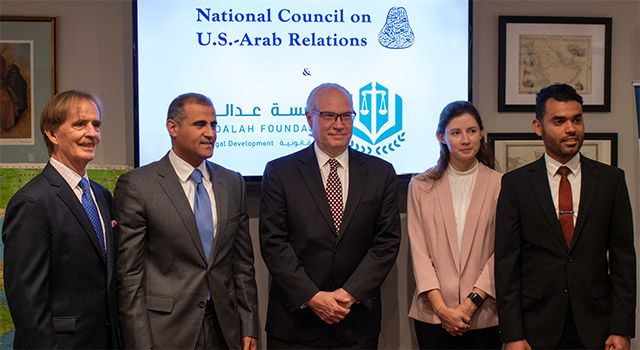
The cooperation agreement between the National Council and the Adalah Foundation was celebrated at a signing ceremony this week at the office of the National Council. In attendance were United States Special Envoy for Yemen Tim Lenderking, Ambassador of Yemen to the United States His Excellency Mohammed Al-Hadhrami, and guests from the Adalah Foundation, the National Council, and the Embassy of Yemen in Washington, D.C., including Council Chairman John Pratt and Council International Advisory Committee Member and Middle East Policy Council President & Chairman of the Board Ambassador (Ret.) Richard Schmierer (not pictured).
With educational resources and support made available to the Yemeni participants by the National Council, the Adalah Foundation will implement the Youth Leadership Development Program / Model Arab League’s educational components of diplomatic simulations, workshops, and conferences to provide learning and training opportunities for Yemeni youth. The Youth Leadership Development Program / Model Arab League helps young individuals develop professional skills that will be vital to their success in whatever path their future takes. Through the Adalah Foundation’s efforts and with the Council’s support, the Youth Leadership Development Program / Model Arab League will provide opportunities for Yemen’s emerging leaders to grow intellectually and professionally to prepare them to address challenges confronting their country, region, and the global community.
National Council Founding President & CEO Dr. John Duke Anthony praised the collaboration between the Council and the Adalah Foundation to further learning and leadership training in Yemen. He remarked, “Involvement in Youth Leadership Development Program / Model Arab League could hardly be more essential. Few programs are as effective in introducing and exploring the complexities facing the people and nations of the world. Just imagine what happens as young leaders of tomorrow analyze and address issues from a perspective different from their own. Not only does it dramatically improve their ability to think critically and empathetically, it also enhances their ability to address the multifaceted range of challenges facing our shared future.”
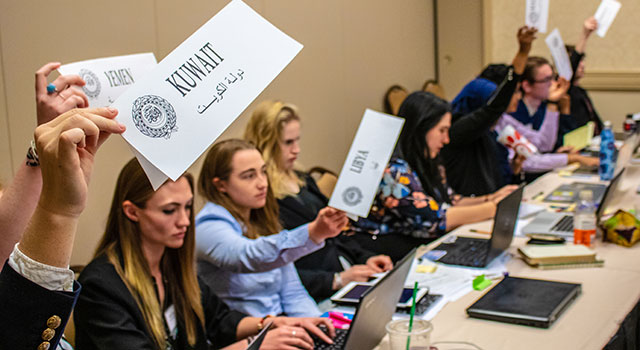
Students utilize parliamentary procedure during Youth Leadership Development Program / Model Arab League sessions. Understanding and utilizing basic rules of meetings helps to train future leaders how to consider viewpoints and make decisions in a fair, consistent, and effective manner.
At a signing ceremony celebrating the cooperation agreement, Founder and Chairman of the Adalah Foundation Mr. Mohammed Bin Hamdeen shared his passion for youth leadership development education, remarking that “this invaluable collaboration with the National Council will train, educate, and uplift Yemen students who are eager to promote diplomacy and peace for the benefit of a peaceful and prosperous Yemen. Youth represent a large percentage of the population and we must engage our future leaders in programs and projects that will prepare them for opportunities and meaningful lives.”
About the National Council on U.S.-Arab Relations: Founded in 1983 and based in Washington, D.C., the National Council is an American non-profit, non-governmental, educational organization dedicated to improving American knowledge and understanding of the Arab region. Information about the Council’s program, projects, events, and activities can be found at ncusar.org.
About the Adalah Foundation: Founded in 2012 and based in Mukalla, Yemen, Adalah (meaning ‘Justice’ in Arabic) is a non-profit foundation dedicated to enhancing effective community participation and youth capabilities toward promoting peace and building the state of law responsive to Yemen’s needs and aspirations. Information about the Adalah Foundation can be found at www.adalah-ye.org.

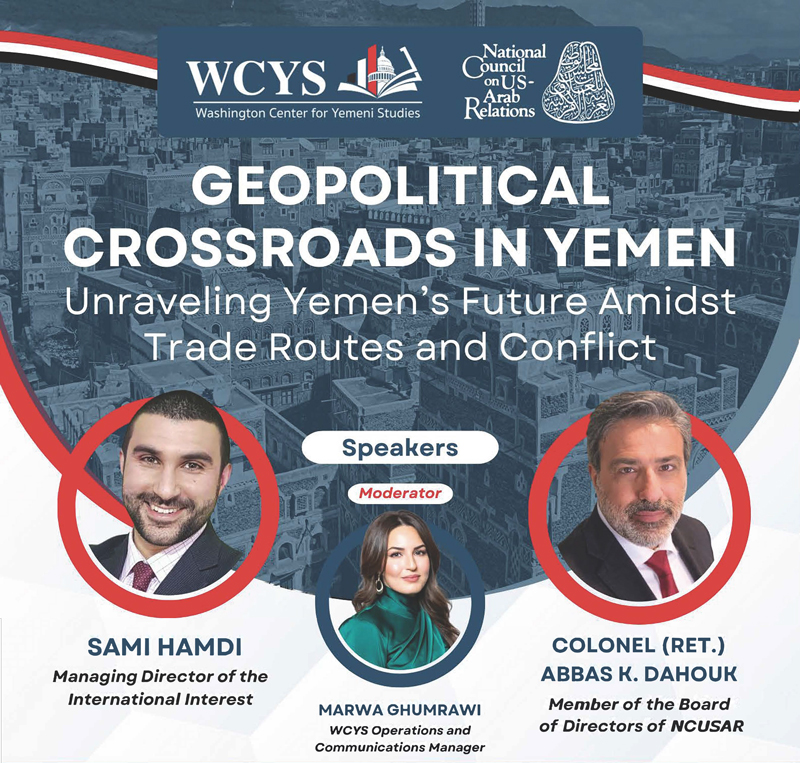
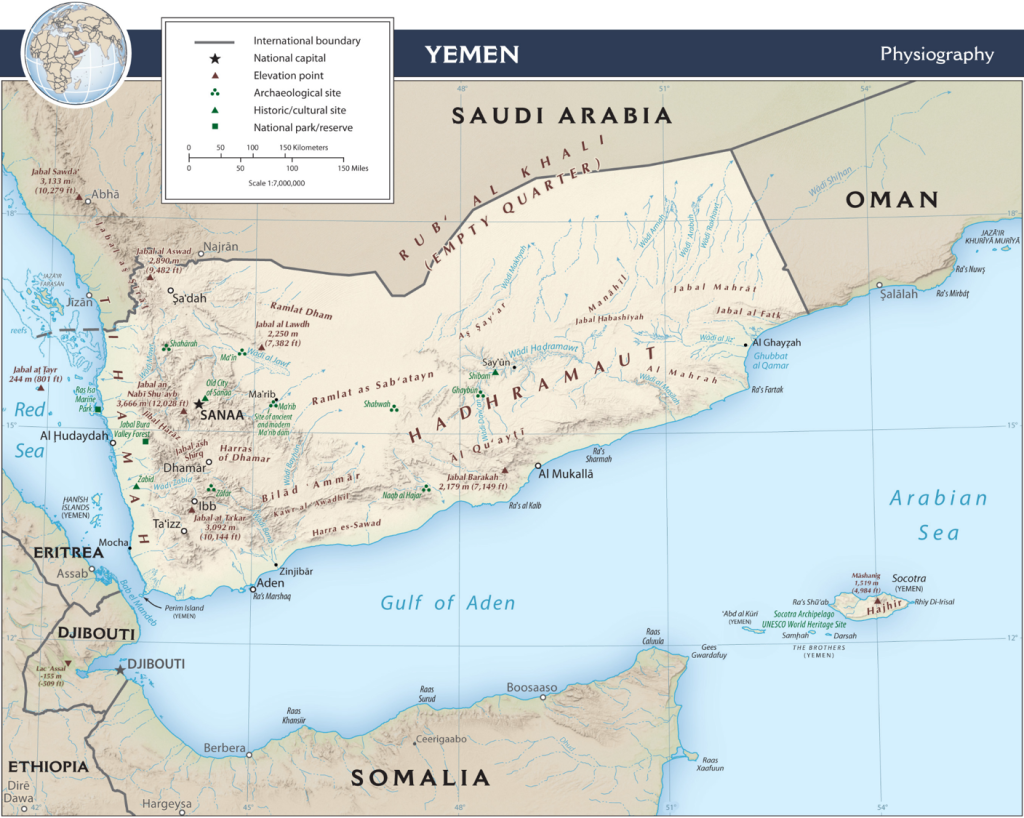
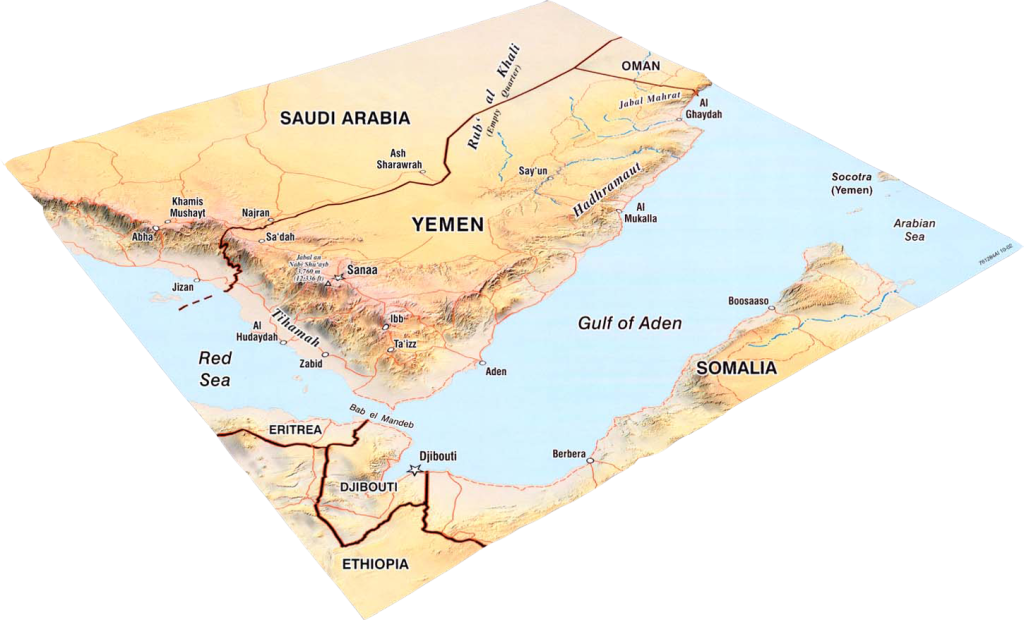


You must be logged in to post a comment.